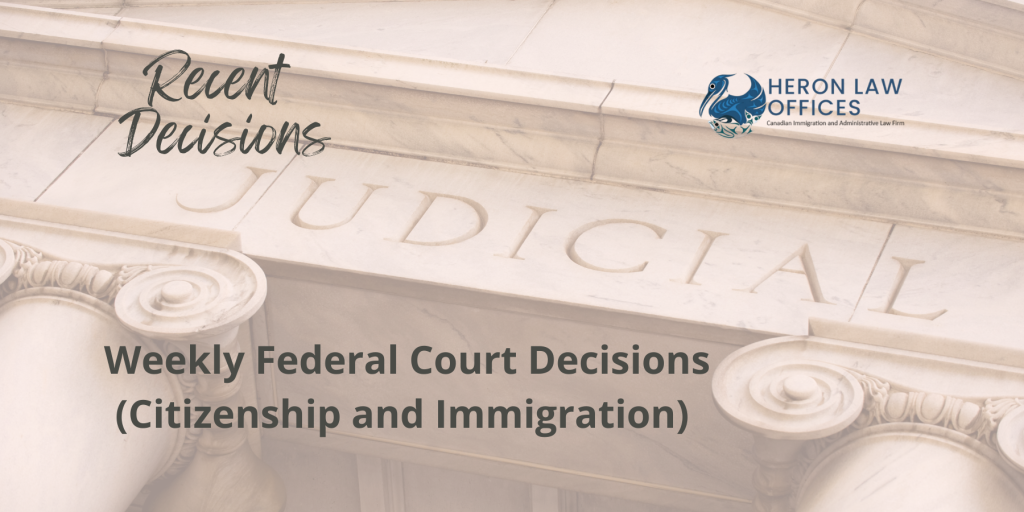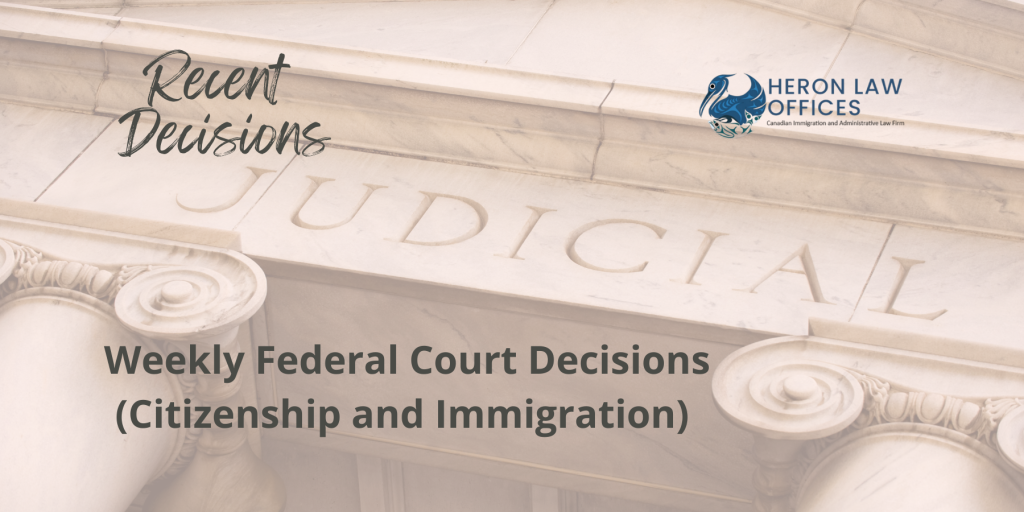
Introducing Heron Law’s first roundup of Federal Court decisions! Staying up to date with the Court is important with the ever-changing immigration landscape. We invite you to check back each week to see what we’ve found interesting and relevant to our work.
Kennedie v Canada – H&C (Woman from Guyana, health issues, caregiver)
In a recent H&C JR, the FC found that the Officer’s decision read more like a risk assessment than an empathetic approach and that the Officer took a segmented approach to H&C factors contrary to the Court’s jurisprudence.
Kong v Canada – Reconsideration (PR Spouse in Canada Class)
In Kong v Canada, Justice Gleeson held that it is not enough for an officer to reconsider a prior decision on the basis that relevant information was not considered to rely on the fact that the initial application was considered on “its substantive merits.”
Instead, the officer’s reasons – which Justice Gleeson writes need not be lengthy – should grapple with and address the core issue(s) raised by an applicant seeking reconsideration, in line with the principle of responsive justification.
Masters v Canada – H&C (BIOC of stepson with Down syndrome)
Last week, in an H&C case where the Applicant was a step-parent and caregiver to a child with Down syndrome, the FC found the Officer’s best interests of the child (BIOC) analysis concerning. The Officer stated that any hardship resulting from the Applicant’s departure could be alleviated using modern communication tools.
Madam Justice Turley calls this reasoning insensitive and non-responsive to the child’s needs, capacity, and age, and cautions against relying on boilerplate reasoning without regard to the circumstances of the affected individuals.
Liu v Canada – PR (TR to PR Pathway, Chinese citizen)
In Liu v Canada (Citizenship and Immigration), a Chinese citizen applied for PR under the temporary TR to PR Pathway policy. He was issued a PFL on the basis of his employment status at the time of the application. The Applicant provided a letter of employment and paystubs covering the relevant period, but the Officer was unsatisfied and denied the PR application.
Justice Diner held that the Officer’s decision to refuse the application on the basis of the proof of employment requirement was unreasonable. The Officer’s decision failed to mention the Applicant’s paystubs, both in the refusal letter and computer notes and did not engage with why the Officer believed the paystubs were problematic.
Soloma Cometa v Canada – PRRA (officer selective review of evidence)
Madam Justice Aylen granted an application for JR of a negative pre-removal risk assessment (PRRA) for a Colombian national on the issue of state protection. It is accepted that the Applicant bears the onus of rebutting the presumption of the adequacy of state protection.
At the same time, the Officer has a positive duty to examine the most recent sources of information in conducting their PRRA analysis, which the Officer in this case only did selectively.
Naimi v Canada (Public Safety and Emergency Preparedness)
In a recent FC case, the Applicants alleged that the RPD refused to consider their abuse of process arguments, arguing that they suffered significant prejudice due to the Minister’s delay in seeking to vacate their refugee status. The Applicants also argued that the Minister breached his duty of disclosure by failing to produce the immigration officer’s notes.
Madam Justice Turley sided with the Applicants. The RPD’s refusal to consider the abuse of process arguments was inconsistent with FC jurisprudence that has held that in the context of vacation proceedings, delay in the Minister’s investigation is relevant in determining whether there has been an abuse of process. The RPD also erred in failing to consider whether the Minister had breached his disclosure obligations.
Reyes Garcia v Canada – Reconsideration of eTA (inadmissibility)
The Applicant, a citizen of Mexico, was found inadmissible to Canada at the port of entry in 2019 on grounds of organized criminality (money-laundering) and misrepresentation (failure to check ‘yes’ on his eTA application about being charged with a crime). On judicial review, the Court found that the CBSA officer failed to make a s. 44(1) report and acted without jurisdiction in finding the Applicant inadmissible.
The Applicant submitted another eTA application in October 2020. He was sent a procedural fairness letter (PFL), to which he responded in March 2021. Having received no decision on the eTA application, he commenced a mandamus application in November 2021. In September 2022, he was sent a second PFL and he provided a response. In October 2022, he received a refusal on his eTA. The application was opened for reconsideration, but in February 2023, the eTA was refused again.
The FC held that on reconsideration, the Officer failed to grapple with the Applicant’s affidavit and that the Officer’s reasons had other serious shortcomings that made the decision unreasonable.
Iroka v Canada – H&C (COVID-19 Temporary Public Policy Healthcare)
In Iroka v Canada (Citizenship and Immigration), Madam Justice Sadrehashemi held that an Officer’s failure to address the Applicants’ submissions about their work on the frontlines during the COVID-19 pandemic was significant. The male adult Applicant worked as a security guard at a long-term care facility and assisted with COVID-19 screening, but he did not qualify for the Temporary Public Policy under s. 25.2 of IRPA (which recognized the extraordinary contribution of refugee claimants working in Canada’s health care sector during the COVID-19 pandemic) because he was not working in one of the designated occupations in the policy.
The Court previously found in Chinwuba v Canada (2023 FC 679) and Uwaifo v Canada (2022 FC 679) that it was unreasonable for the Officer not to evaluate this factor as part of the applicants’ personal circumstances. Likewise, Madam Justice Sadrehashemi opined that the Officer’s treatment of this issue was not responsive to the Applicants’ submissions.
Saad v Canada – SP (Restoration, New Applications, Bangladesh)
A Bangladeshi national applied for restoration of his status and for an extension of his study permit, but mistakenly did not upload the required documents to the IRCC portal before the deadline. He was advised by IRCC that he was without status and that he needed to leave Canada. He returned to Bangladesh and applied for a new study permit, which was refused. He submitted another application, including a letter of explanation about IRCC’s request for documents. Again, he was refused on the basis that the purpose of his visit was not consistent with a temporary stay. The Officer was not convinced that the Applicant would leave Canada because he previously did not comply with all conditions in R. 183 of the IRPR.
Justice Grant found that the Officer’s reasons lacked any explanation as to how or why the purpose of the Applicant’s visit was not consistent with a temporary stay. The Applicant also left Canada soon after his restoration application was refused. Furthermore, Justice Grant found the Officer’s reasons to be templated language that was not adapted to the Applicant’s situation.
Disclaimer: The information on these pages is for general use only and should not be relied upon as legal advice. The summary here is not designed to be comprehensive. It is designed to collect some cases that we believe are interesting to practitioners.




